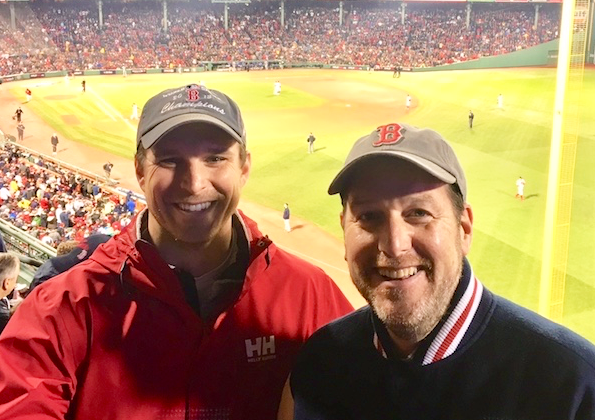By Evan M Benjamin, MD, MS, FACP
If you are anywhere in the vicinity of Boston these days, you’ve probably been swept up in the World Series excitement. As I write this, the Red Sox have won two of seven and we’ll be tuned in for Game 3 in L.A. tonight. Like any insufferable baseball fan, I espouse the “baseball as life” metaphor. Baseball even has something to teach healthcare.

Dr. Evan Benjamin and Kurt Lowery, a Project Manager at Ariadne Labs, at Game 1 of the 2018 World Series at Fenway Park
I grew up in Boston and in the summer of 1975, I landed the dream job for a New England teenager: I sold souvenirs at Fenway Park. That summer became a memorable one for me and the Red Sox. As I watched from the stands, the Red Sox managed to win the American League Pennant and go to the World Series. I became a real student of the game that summer as I learned the subtleties of baseball and why so many see life lessons in the game.
No one captured the metaphor of baseball as life more than Yogi Berra, the star baseball player and manager for the hated rival team, the New York Yankees. Herein, I offer some Yogi wisdom as lessons for healthcare quality and patient safety.
“Baseball is 90% mental…the other half is physical.”
What about healthcare? I agree with Yogi that it is about 90% mental, and it is also 50% physical AND 50% judgment. Bad judgment can overshadow good skill level any day of the week. All too frequently across the country we hear about medical errors that force us to question what that healthcare provider was thinking. We can minimize events by employing simple tools such as standard protocols for common treatments, checklists for surgeries and other procedures, and verification time‐outs for procedures. We should be mentally and physically ready to prevent errors.
“You can observe a lot just by watching.”
We can learn a lot from other people’s mistakes, yet often healthcare workers keep their mistakes to themselves or fail to report the ones they do see happening. By doing so, errors perpetuate and we do not learn from the mistakes. We must be transparent about adverse events. Most are the result of system errors and we must trust a “just culture” to deal with our human errors. Reporting events and near misses to our Safety Reporting System allows us to “observe” and learn.
“If you can’t imitate him, don’t copy him.”
In technical and performance based activities, merely saying that one is capable doesn’t make it so. Healthcare needs to be competency based. We must mentor and coach each other and create minimum competency thresholds to perform certain tasks on patients. Ongoing assurance of competency needs to exist at all levels of the medical profession.
“When you come to a fork in the road, take it.”
Healthcare decision‐making is a complex activity. We need to have input from many members of the team. Like baseball, healthcare is a team sport, and we need all team members engaged around the care plan, helping to make decisions.
“It ain’t the heat, it’s the humility.”
Many healthcare providers could benefit from practicing humility in our day‐to‐ day encounters with all of the healthcare team members. We can and should learn from each other. Sometimes events occur when less experienced team members are afraid to question an over‐confident partner on the team. Patients suffer when the team is fractured and there is poor communication among providers as a result of entrenched egos.
Finally, Yogi most famously told us that in baseball, “it ain’t over til it’s over.” We must be committed to building cultures that support long-term quality improvement. We can always do better — the work is never done. A safety mindset is key for us to live up to our most important calling: DO NO HARM.
Thanks Yogi, but Go Red Sox!
Evan Benjamin, MD, MS, FACP is the chief medical officer of Ariadne Labs and admittedly lacks humility when it comes to all things Red Sox.



